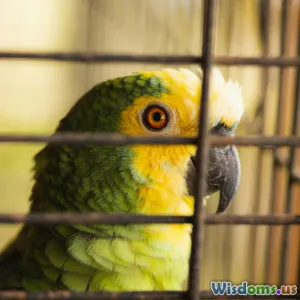
Are Exotic Pets Ethical Debating the Rise of Unusual Animal Companions
9 min read Explore the ethics of exotic pet ownership amid the rise of unusual animal companions worldwide. (0 Reviews)
Are Exotic Pets Ethical? Debating the Rise of Unusual Animal Companions
Introduction
In recent years, the allure of owning an exotic pet—ranging from colorful parrots and sleek reptiles to charismatic primates and enigmatic amphibians—has captured the imagination of animal lovers worldwide. The rise of social media showcasing these unusual companions has further fueled demand, making exotic pet ownership a growing trend. But beneath this fascination lies a complex and provocative question: Are exotic pets ethical?
Exploring the ethics behind keeping wild or unusual animals as companions touches on animal welfare, species conservation, ecological impacts, and human responsibility. This article navigates this rich debate, examining the factors that must be considered before welcoming an exotic animal into our homes.
Understanding Exotic Pets: Defining the Unusual
Exotic pets are generally considered non-domesticated animals not commonly kept as traditional pets such as dogs or cats. Their classification ranges widely and includes:
- Reptiles: snakes, lizards, turtles
- Birds: macaws, cockatoos, toucans
- Mammals: primates, sugar gliders, hedgehogs
- Amphibians and Fish: poison dart frogs, exotic fish species
This variety means the ethical considerations also vary dramatically depending on the species’ natural habitat, biological needs, and behavior.
The Ethical Dimensions of Exotic Pet Ownership
1. Animal Welfare Concerns
A primary ethical concern is the well-being of the animals themselves. Many exotic species have intricate social structures, special dietary needs, and require specific environments to thrive—factors challenging to replicate in captivity.
For example, chimpanzees are highly intelligent and social animals, often living in complex communities of up to 150 individuals in the wild. Captive environments rarely provide sufficient socialization or enrichment, leading to physical and psychological problems like self-harm and depression. According to the Jane Goodall Institute, primates used as pets often suffer from neglect and abuse due to owners’ lack of expertise.
Similarly, reptiles such as the green iguana require ultraviolet light to synthesize vitamin D3 and specific humidity levels. Improper care can cause metabolic bone disease and other ailments. Unfortunately, surveys have shown that a significant number of reptile owners lack adequate knowledge, resulting in high mortality rates.
2. Impact on Conservation and Wild Populations
The exotic pet trade, particularly when fueled by wild capture, poses a severe conservation threat. Millions of exotic animals are removed from their natural habitats yearly to meet global demand, often with detrimental ecological consequences.
The World Wildlife Fund (WWF) highlights the example of the blue-and-yellow macaw population in South America, which has declined significantly partly due to illegal pet trade. Wild harvesting disrupts ecosystems and threatens species with extinction.
On the other hand, some breeders argue that captive breeding programs can reduce pressure on wild populations and help conserve threatened species. However, these programs must be transparent and prioritize conservation goals over commercial interests.
3. Legal and Regulatory Challenges
Exotic pet ownership is regulated unevenly across regions, creating a patchwork of statutes that sometimes fail to protect both animals and the public.
For instance, the United States enforces the Lacey Act and CITES (Convention on International Trade in Endangered Species) to control illegal wildlife trade. Despite these measures, loopholes and inadequate enforcement allow prohibited exotic pets to enter markets.
Certain jurisdictions have introduced stringent bans or licensing requirements, such as New York's Exotic Animal Ownership Law, implemented after tragic incidents involving captive big cats. Still, discrepancies among policies create challenges for enforcement and consistent animal welfare standards.
4. Risks to Human Safety and Public Health
Some exotic animals pose risks to humans, including zoonotic diseases, bites, or escapes. The Centers for Disease Control and Prevention (CDC) have reported outbreaks of salmonella linked to pet reptiles and amphibians. Additionally, large carnivores like exotic big cats present inherent dangers when kept in domestic environments.
There have been notable cases where escaped exotic pets caused injuries or fatalities, prompting calls for stricter regulations. Responsible ownership must prioritize not only the animal’s welfare but also human safety.
The Arguments Supporting Exotic Pet Ownership
Despite the challenges, proponents argue that owning exotic pets can foster awareness and appreciation for wildlife. They suggest the following benefits:
- Education and Conservation Advocacy: Responsible owners sometimes participate in education programs that highlight species plight and conservation needs.
- Rescue and Sanctuary Efforts: Some exotic pets are rescued from illegal trade or abusive situations, finding refuge in private homes or sanctuaries.
- Companionship and Mental Health Benefits: Many exotic pet owners report deep companionship and enrichment, especially with animals that provide unique interactions not achievable with common pets.
Notably, reputable exotic pet owners and breeders emphasize the importance of research, proper care, and adherence to legal frameworks to mitigate possible harms.
Responsible Exotic Pet Ownership: Best Practices
For those genuinely committed to ethical exotic pet ownership, the following principles serve as a guideline:
- Thorough Research: Understanding species-specific needs including habitat, diet, social structure, and health requirements.
- Acquisition from Ethical Sources: Prioritizing captive-bred animals over wild-caught to reduce ecological impact.
- Legal Compliance: Ensuring adherence to local, national, and international laws.
- Environment Enrichment: Providing large, secure, and stimulating enclosures that mimic natural habitats.
- Veterinary Care: Access to specialized veterinarians familiar with exotic species.
- Contingency Planning: Preparing for long-term commitment and potential challenges.
Organizations like the Association of Zoos and Aquariums (AZA) offer resources and accreditation for breeders and sanctuaries that meet high welfare standards.
Conclusion: Navigating the Complex Ethics of Exotic Petkeeping
The rising interest in exotic pets reflects humanity’s enduring fascination with the wild and unknown. Yet, this trend brings forth profound ethical challenges that cannot be overlooked.
Animal welfare, biodiversity conservation, public safety, and legal considerations intersect to form a delicate ethical framework. While responsible ownership with proper knowledge and resources can mitigate some concerns, the risks inherent in keeping exotic animals as pets remain significant.
Ultimately, making ethical choices about exotic pet ownership demands critical reflection, respect for wildlife, and a commitment to responsible stewardship. By fostering informed debates and raising awareness, society can better protect both the remarkable creatures we admire and the ecosystems they inhabit.
References
- Jane Goodall Institute – Challenges of Keeping Primates as Pets
- World Wildlife Fund – Impact of Illegal Pet Trade on Bird Species
- Centers for Disease Control and Prevention – Reptile-Associated Salmonella
- Lacey Act and CITES: Wildlife Protection Laws
- Association of Zoos and Aquariums – Standards for Exotic Pet Ownership
Author's note: Whether fascinated by the allure of a colorful parrot or intrigued by the enigmatic charm of amphibians, understanding the responsibilities behind exotic pet ownership is vital for protecting these animals and our shared environment.
Rate the Post
User Reviews
Other posts in exotic pets
Popular Posts















